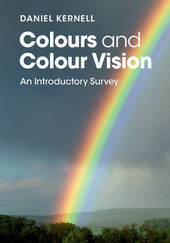
|
Colours and Colour Vision: An Introductory Survey
Paperback / softback
Main Details
| Title |
Colours and Colour Vision: An Introductory Survey
|
| Authors and Contributors |
By (author) Daniel Kernell
|
| Physical Properties |
| Format:Paperback / softback | | Pages:271 | | Dimensions(mm): Height 243,Width 174 |
|
| Category/Genre | Theory of art
Neurosciences |
|---|
| ISBN/Barcode |
9781107443549
|
| Classifications | Dewey:152.145 |
|---|
| Audience | | Tertiary Education (US: College) | | Professional & Vocational | |
|---|
| Illustrations |
7 Tables, black and white; 45 Plates, color; 2 Halftones, black and white; 18 Line drawings, black and white
|
|
Publishing Details |
| Publisher |
Cambridge University Press
|
| Imprint |
Cambridge University Press
|
| Publication Date |
10 March 2016 |
| Publication Country |
United Kingdom
|
Description
Colours are increasingly important in our daily life, but how did colour vision evolve? How have colours been made, used and talked about in different cultures and tasks? How do various species of animals see colours? Which physical stimuli allow us to see colours and by which physiological mechanisms are they perceived? How and why do people differ in their colour perceptions? In answering these questions and others, this book offers an unusually broad account of the complex phenomenon of colour and colour vision. The book's broad and accessible approach gives it wide appeal and it will serve as a useful coursebook for upper-level undergraduate students studying psychology, particularly cognitive neuroscience and visual perception courses, as well as for students studying colour vision as part of biology, medicine, art and architecture courses.
Author Biography
Daniel Kernell is Emeritus Professor of Medical Physiology at the University of Groningen, The Netherlands.
Reviews'... this book is exactly what it says on the cover: an introductory survey, and an excellent one at that. It is likely to inform and benefit quite a broad readership both within and without academia and I recommend it, particularly for mid-level to advanced undergraduate students of psychology or cognitive neuroscience taking visual perception courses. It will make a good read for anybody else interested in colour vision with a broad art, science or technology background or just curious.' C. Alejandro Parraga, Perception
|